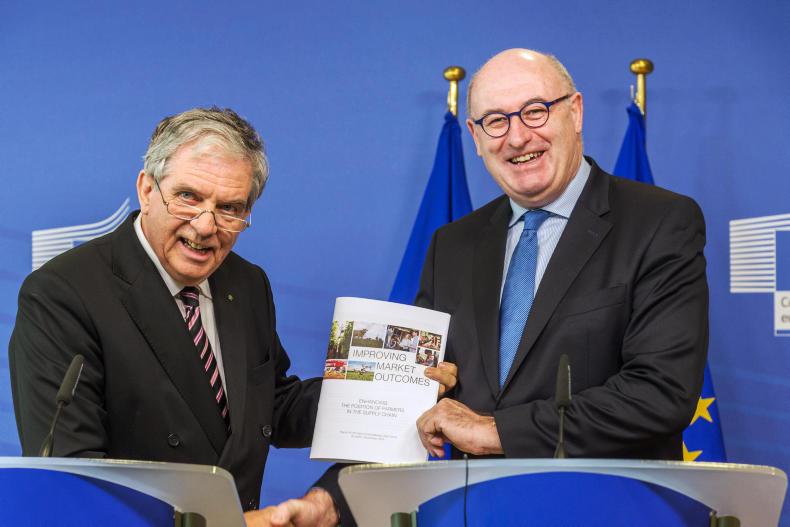While the future of direct payment support to farmers in NI is in doubt after Brexit, for those farmers remaining within the EU, significant change is also likely.
Speaking at the Agri-Food Strategy Board’s third supply chain forum event held at Greenmount last week, ex-Dale Farm chief Dr David Dobbin questioned whether direct payments to European farmers will last much beyond 2020.
Dobbin has a strong insight into the thinking within the European Commission, having recently been part of a 12-member agri-markets taskforce set up by European Commissioner for Agriculture and Rural Development Phil Hogan to look at farmers’ position in the supply chain.
He believes there is a new direction of travel for agricultural policy in Europe. “The remaining EU 27 are under more budget pressure due to enlargement. Countries that joined in recent years didn’t come with big dowries. If we had stayed in, the next CAP reform would have reduced significantly direct payments. Europe is now heading back towards a capability investment,” Dobbin claimed.
For him, that means the Commission will seek to improve market transparency, regulate for unfair trading practices, look to reduce price volatility and put measures in place to stabilise farm incomes.
These various issues are included as part of the recommendations of the agri-markets taskforce, which reported in December 2016. It called for more up-to-date information regarding prices and price trends. “We need European indicators, based on European data, on a weekly basis. In the dairy industry, for example, we need to get away from using Fonterra data as the basis for current trends,” said Dobbin.
To manage risk, the taskforce recommended that the Commission assess the possibility of co-financing insurance schemes – in bad times, an insurance payment cuts in. “The Commission might take money out of direct payments to finance this. The problem with insurance is that you usually pay more than you get back,” suggested Dobbin.
On futures markets, the taskforce highlighted that it could be an important risk management tool for farmers in times of volatile prices. However, if a futures market becomes more developed, it could end up being the main driver of prices and bring more volatility, not less, warned Dobbin.
One area where the Commission is keen to regulate is in unfair trading practices, and replicate the situation in the UK where a Groceries Code Adjudicator (Christine Tacon) is already in place. The aim will be to stop key unfair trading practices, such as retailers pulling supply contracts with processors at short notice. “In the UK, most of that is gone, or on the way out. In my view, Tacon has done a brilliant job. But in eastern Europe, some parts are chaotic,” Dobbin maintained.
While the future for direct payments is uncertain, in or out of the EU, one area where the agri-food industry could lose out as a result of Brexit is access to EU finance. “The EU has significant resources to lend money. It is money to fund farm improvements and farmer capability,” said Dobbin. He also pointed out that farmers tend to be further up the policy priority in Brussels than in London, so there is a major task ahead around Brexit, particularly given that it will be a key priority for the British government to stop food prices rising.
“Europe has identified solutions it wants to kick-in during the next CAP reform. We need to take the bits of it we like, and lobby hard,” suggested Dobbin.
DAERA officials are understood to be already working on a NI version of a draft British Agricultural Policy post-Brexit.
The chair of the NI Food and Drink Association (NIFDA), Declan Billington is increasingly the go-to person for a view on Brexit from the local agri-food industry.
Speaking at the supply chain forum last week, Billington said it was vital that the industry here is able to identify a roadmap for success and then work collectively to get its voice heard where central policy is being devised in London.
“Brexit can swing in our favour with the right policies or could go the other way and be very damaging to our industry, particularly if the government trade agriculture for financial services (in trade deals),” he said.
The most obvious opportunity for the agri-food industry from Brexit is to displace imports into the UK market. The UK has a significant trade imbalance in many of the main agricultural sectors (eg importing £2bn of poultry products and exporting only £380m), so trade barriers could create opportunities. But the meat industry is heavily reliant on international markets for carcase balance – ie to sell parts of the carcase UK consumers don’t want to eat. Also, two of our major dairy processors (Lakeland and LacPatrick) have significant business in Europe and around the world.
“NI needs a trade deal with the EU post-Brexit – without it we can’t address the issues such as our land border with another member state. The prime minister has said no deal is better than a bad deal – that is not the case for us,” claimed Billington.
One possible way of solving the issue in Ireland is for a system of tariff-free quotas to be agreed based on the current movement of goods across the Irish border. Or perhaps it might be possible to refine rules around country of origin – where milk, beef, lamb or pork is produced in NI, moved to the south for processing, it could then come back into the UK while avoiding tariffs. “We need some fall-backs to deal with north-south trade. I do believe there is a desire to minimise the issues,” Billington said.
Whatever happens, he maintained it was vital that there is a period of transition, allowing the industry time to adjust to any new trading environment.






 This is a subscriber-only article
This is a subscriber-only article










SHARING OPTIONS: